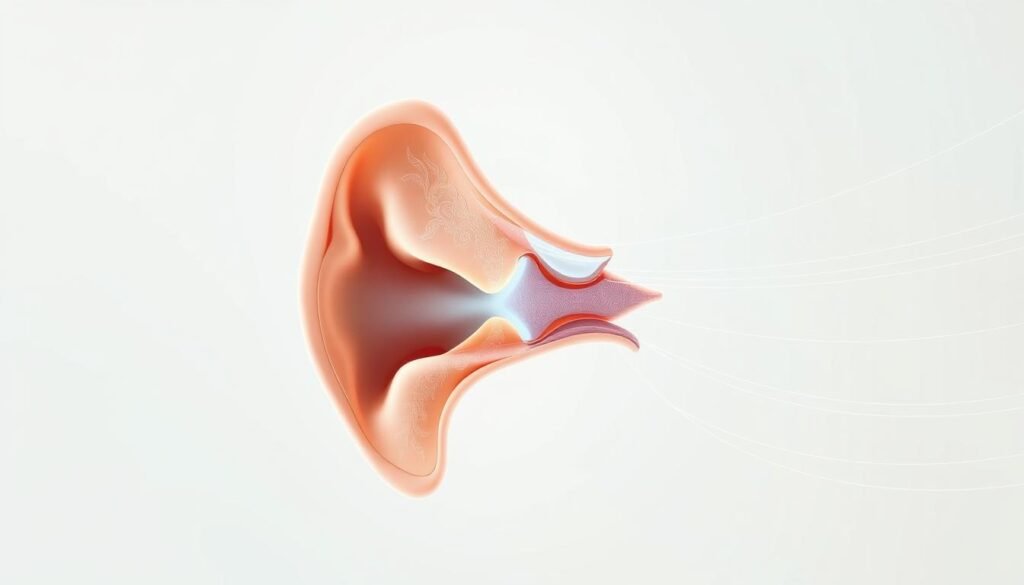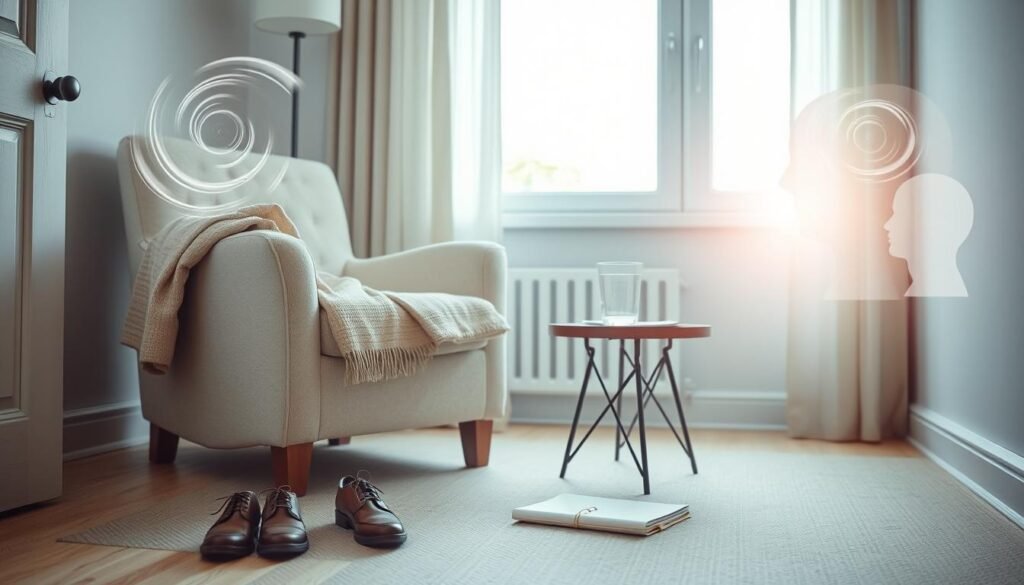About 10% of adults deal with severe dizziness. It can mess with their daily life. This shows how many different reasons there are for feeling dizzy. Dizziness is not always about anxiety. For example, problems with the inner ear, not enough blood going to the brain, and some medicines can cause it too. We will look at how Other Causes of Dizziness and Anxiety differ. This helps people know what signs to watch for. It makes it easier to tell them apart.
Key Takeaways
- Dizziness affects a significant portion of the population, often linked to both physical and psychological causes.
- Understanding the various causes, including vestibular disorders and medications, is vital to addressing dizziness effectively.
- Anxiety symptoms can mimic dizziness, complicating diagnosis and treatment.
- Conditions like anemia and dehydration can lead to dizziness, highlighting the importance of overall health.
- Seeking professional advice is essential in distinguishing between anxiety-induced dizziness and other medical conditions.
Understanding Dizziness: An Overview
Dizziness can make you feel like you’re spinning or unsteady. It’s important because it might show health problems. Knowing about dizziness helps those feeling it.
The vestibular function is key in keeping us balanced and knowing where we are in space. It involves our inner ear and brain. If disrupted, we can feel dizzy. Common causes include ear issues, brain conditions, and some medicines.
- Benign paroxysmal positional vertigo (BPPV) is commonly identified as a primary cause of vertigo.
- Viral infections like vestibular neuritis can result in ongoing vertigo symptoms.
- Meniere’s disease might cause unexpected vertigo episodes alongside hearing loss.
- Conditions affecting circulation, such as orthostatic hypotension, can also provoke dizziness.
It’s important to know the different types of dizziness because each type needs its own treatment. Recognizing dizziness’s ties to anxiety is crucial too. For help, check out this comprehensive guide here.
The Connection Between Dizziness and Anxiety
Anxiety and dizziness are closely linked due to the body’s stress responses. Over 18 percent of people, or more than 40 million adults in the U.S., feel this every year. These symptoms cause physical effects, like feeling dizzy. The fight or flight response raises stress hormones like cortisol. This can mess with your balance by affecting the inner ear.
Many with chronic anxiety often feel very dizzy. Stress makes this worse, creating a cycle. Dizziness makes anxiety bad, and then anxiety makes dizziness worse. A study showed those with anxiety disorders are more likely to get benign paroxysmal positional vertigo (BPPV). This shows how dizziness and anxiety are connected.
A study found severe dizziness can make anxiety worse and lower life quality. Chronic dizziness might even cause emotional problems, making anxiety and balance issues harder to handle. Symptoms like fast heart rate and shaking can happen with dizziness, which is scary.
To manage both, integrated treatments are key. This can include therapy, changing how you live, and sometimes medicine. Breathing exercises and balance rehab can help a lot in feeling better.

Other Causes of Dizziness vs Anxiety
Dizziness can come from many medical issues, not just anxiety. It’s important to fully understand its causes. Knowing what causes dizziness helps doctors treat it properly. There are three main types of conditions that can cause dizziness. These include vestibular disorders, neurological issues, and cardiovascular problems.
The Role of Vestibular Disorders
Vestibular disorders play a big part in causing dizziness. Issues like Benign Paroxysmal Positional Vertigo (BPPV) disrupt balance. This leads to a spinning feeling. Such disorders can affect how you do daily things. People might think their dizziness is all because of anxiety. Knowing about these disorders helps in treating them better. For these conditions, physical therapy is often suggested. It helps people balance better and move confidently.
Neurological Issues Impacting Dizziness
Neurological issues often lead to dizziness too. Migraines, for example, can make 30% to 50% of people feel dizzy. More serious conditions like strokes can show similar symptoms. Early detection of these issues is key. Dizziness can be a sign of serious health problems. A detailed check-up can tell if dizziness is from anxiety or a neurological condition.
Common Cardiovascular Conditions Linked to Dizziness
Heart-related issues are also linked to dizziness. Problems like arrhythmias or low blood pressure can make you feel lightheaded. Or even like you might faint. These conditions need quick medical attention. This is especially true if dizziness comes with chest pain or breathing troubles. Knowing if your dizziness is heart related or from anxiety is crucial. It helps get the right treatment and stresses the importance of seeing a doctor.

Understanding how dizziness connects with various medical issues shows how complex it is. For more info on how anxiety affects dizziness, check out this resource.
Identifying Dizziness Symptoms
It’s important to know the different kinds of dizziness to treat them right. Dizziness can show up in many ways. Knowing the symptoms helps figure out the problem. There are two main kinds, lightheadedness and vertigo. Dizziness can also be short-term or long-lasting.
Lightheadedness vs. Vertigo
Lightheadedness makes you feel faint or like you’re floating. It can make you feel unstable or weak. This might happen if you’re dehydrated, get up too quickly, or are anxious. Vertigo is different. It makes you feel like you or everything around you is spinning. It’s often caused by issues with the inner ear. Conditions like Ménière’s disease or benign paroxysmal positional vertigo (BPPV) are common causes.
Acute vs. Chronic Dizziness
Dizziness can be sudden or ongoing. Sudden dizziness can come out of nowhere, like during panic attacks. This type of dizziness can be scary. It may need quick medical help if you also have a high fever or chest pain. On the other side, ongoing dizziness lasts over time. It might point to deeper health problems. Things like vestibular disorders or brain issues could be causing it. Knowing the difference between these helps people and doctors decide on the best treatment.

| Type of Dizziness | Description | Common Causes |
|---|---|---|
| Lightheadedness | Feeling faint or floating | Dehydration, anxiety, low blood pressure |
| Vertigo | False sensation of movement or spinning | Ménière’s disease, BPPV, vestibular neuronitis |
| Acute Dizziness | Sudden onset of dizziness | Panic attacks, migraines, certain medications |
| Chronic Dizziness | Persistent dizziness over time | Vestibular disorders, neurological conditions, chronic inner ear issues |
Anxiety Symptoms Accompanying Dizziness
Understanding how anxiety and dizziness are linked is important. It helps people recognize and handle their symptoms better. Panic attacks and hyperventilation are big factors that cause dizziness. Knowing these conditions and how they make us feel physically is key.
Panic Attacks and their Physical Manifestations
Panic attacks bring on many uncomfortable physical signs. These include a fast heartbeat, sweating, and feeling detached from reality. Dizziness is also a common symptom during panic, affecting how we operate daily. A study in Germany with 1,287 people found that over 25% with dizziness also had anxiety. This shows how panic attacks can make dizziness worse.
Hyperventilation and its Effects
Hyperventilation is crucial in connecting anxiety and dizziness. It happens due to anxiety and causes low carbon dioxide in our blood. This leads to feeling light-headed and disoriented. If you’re hyperventilating, dizziness may get worse when you’re very anxious. Learning controlled breathing helps lessen these symptoms and boosts well-being. Click here for more on how anxiety affects dizziness.
How Medications Can Influence Dizziness
Many medicines may cause dizziness, which is a big worry for those depending on them for their health. Knowing how side effects from medications link to dizziness is key. Drugs may affect the inner ear or change blood pressure, leading to feeling dizzy.
Common Medications and their Side Effects
Several prescription drugs are known to cause dizziness. This makes it hard to figure out why a patient feels dizzy. Here’s a table showing some common drugs that can cause dizziness and other side effects:
| Medication Class | Example Medications | Reported Side Effects |
|---|---|---|
| Antidepressants | Venlafaxine, Fluoxetine | Dizziness, blurred vision |
| Anti-inflammatory | Aspirin, Ibuprofen | Dizziness, tinnitus |
| Antihypertensives | Lisinopril, Amlodipine | Dizziness, lightheadedness |
| Anti-convulsants | Carbamazepine, Lamotrigine | Dizziness, fatigue |
| Antibiotics | Gentamicin, Ciprofloxacin | Dizziness, nausea |
For patients, especially those already dealing with anxiety, it’s important to tell apart dizziness from meds from anxiety symptoms. Knowing the difference helps doctors make better treatment plans. Being well-informed can assist in controlling how dizziness affects one’s life.
Dehydration and Inner Ear Problems as Causes of Dizziness
Dizziness can come from many causes, like not having enough water or ear issues. Knowing about dehydration and inner ear problems helps in treating dizziness effectively. These problems can look like the dizziness anxiety causes, so it’s important to tell them apart.
Understanding the Impact of Dehydration
Dehydration happens when you lose more water than you drink. This makes your blood volume go down. When this happens, your blood pressure drops, making you dizzy. You might feel thirsty, have dry skin, and be very tired.
Getting dizzy from not drinking enough water can happen if you sweat a lot, work out hard, or don’t drink enough water. If you notice these signs, drinking more water can help stop worse problems.
Inner Ear Issues that Lead to Dizziness
Inner ear problems are a common reason for feeling dizzy. Conditions like BPPV make you feel short dizzy spells when you move your head a certain way. Meniere’s disease is harder to deal with. It makes you have long dizziness attacks, problems hearing, and a ringing sound in your ears.
Other times, viruses cause inner ear infections like vestibular neuritis and labyrinthitis. These infections mess with your balance, making you dizzy. Knowing about these ear issues is key. They need different treatments than dizziness from not drinking enough water or from stress.
When to Seek Professional Help
Dizziness can feel brief, yet knowing when to seek help is key. Certain symptoms are red flags needing quick action. If you feel suddenly dizzy with severe headaches, fainting, chest pain, or changes in how you move or think, get help immediately. These signs could mean serious health problems that need a doctor’s care.
Identifying Red Flags in Symptoms
It’s crucial to recognize the warning signs. Key symptoms to watch for include:
- Sudden dizziness lasting more than a few minutes
- Severe headaches resembling migraines
- Loss of balance or coordination
- Vision changes such as blurriness or loss of vision
- Chest pain or pressure
- Weakness or numbness, especially on one side of the body
Seeing any of these signs means it’s time to call a healthcare provider fast.
Understanding the Referral Process for Specialists
When you tell your doctor about dizziness, they may run tests. They might check your blood for infections or heart issues. If they find something, they may send you to a specialist.
Specialists, like neurologists or otolaryngologists, do further tests. They look for more severe issues or help diagnose the problem. Your doctor will then guide you to the right treatment. This can include therapy or lifestyle changes for dizziness.
People with anxiety causing dizziness can get help too. The National Health Service suggests counseling and relaxation to manage it. If you’re dealing with anxiety, find tips here.
Conclusion
The link between dizziness and anxiety is complex, with many shared symptoms. This makes it hard to diagnose them properly. Dizziness is common, especially in older adults. A lot of people feel dizzy at some point. Though it’s often not serious, knowing if the cause is mental or physical is key to treating it.
Handling anxiety well can be crucial for those dealing with these issues. A mix of medicine, therapy, and lifestyle changes can really help. It’s important to know when to get medical help, like if you have new headaches, fall, or have balance problems after hitting your head.
Getting to grips with how dizziness and anxiety interact helps people find the right support. More knowledge means better health by treating both issues together. This ensures everyone gets the help they need.